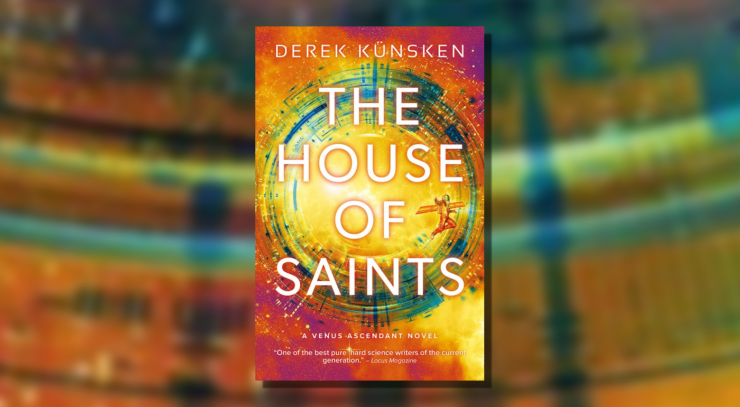George-Étienne and his children have formed The House of Styx, after finding a mysterious artefact on the surface of Venus herself.
We’re thrilled to share an excerpt from The House of Saints by Derek Künsken, the conclusion to the Venus Ascendant space opera series—out now from Solaris.
George-Étienne and his children have formed The House of Styx, after finding a mysterious artefact on the surface of Venus herself. But with the discovery comes great risk, not only from a planet that kills with its very touch but also from the banks and powers of old Earth, who will stop at nothing to claim this new technology for themselves.
From humble origins, The House of Styx is determined to become one of the most powerful families in the known galaxy or die trying.
“Will they be okay?” Marie-Pier asked George-Étienne. She was gently sliding a worn pad covered in bicarbonate paste over the seals of Gabriel-Antoine’s suit in the airlock. “Hold still, you,” she added.
“Pascal is a good boy,” George-Étienne said. “He’ll keep them safe. They have to learn.”
Marie-Pier said nothing about Pascale’s secret. It wasn’t hers to tell. She didn’t know anyone who’d lived something like this. She hoped George-Étienne would react well when he found out.
“Oui,” she agreed.
She turned in the cramped airlock to neutralize George-Étienne’s back and suit seals while Gabriel-Antoine’s lethargic hands did the same to her. The D’Aquillon patriarch no longer intimidated her. In the months since she’d met him, she hadn’t seen the reputed rages, although she’d seen the tough endurance of the man. They’d all withstood a lot, and had more to endure yet.
They have to learn. Would her children have to learn that same endurance? She hoped not. Not yet. Maxime and Florian were too young, although not much younger than Alexis. Children had to grow up fast on Venus, but she didn’t want that for hers.
Buy the Book


The House of Saints
They cycled through the inner airlock door and removed their suits, piece by piece. The coolest the habitat could get at this altitude was about twenty-eight degrees. Whatever modesty they might have had before had been quickly shucked in the last weeks, not just from the tight quarters but the daily grind of using the suits. They stank of old sweat and new, of bodily processes, of breath soured by long hours with nothing but sipped water and bitter protein pills.
The Causapscal-des-Vents rationed and recycled its precious little water, so bathing was a wet cloth, after which she put on a light hemp robe, something that had belonged to Marthe. Gabriel-Antoine put on a pair of shorts. He had a beautiful, hard body, on display as he collapsed on a hammock and closed his eyes. She touched his hot forehead and held out a bowl of soup.
“You might have heat exhaustion again,” she said.
“Not as bad as the other times,” he mumbled.
She held the bowl to his lips. “Stay awake. Drink.”
He sat sluggishly and made a face as he drank the soup.
George-Étienne appeared with soup for her. “Same for you,” he said.
She patted Gabriel-Antoine’s head and went to the table with George-Étienne. The patriarch of the D’Aquillon family—and the head of the House of Styx now, she supposed—had quiet moods she’d come to recognize. The staring at the cup. The eyes that no longer cried, but that still reddened at the edges. The slight quirk of a lip that had been a mannerism of Marthe’s too. George-Étienne carried with him his pasts and his might-have-beens. She put a hand on his.
She didn’t have words for his loss, there were none. She’d discovered that when her husband had died, when every day had been like sleepwalking through an oppressive darkness. Those around her couldn’t carry any of the burden of grieving, only accompany her in some kind of solidarity, everyone hoping that the blackness would one day slough off like a scab. She squeezed and he squeezed back.
Gabriel-Antoine slurped his soup down, made a sound of disgust and shuddered at the taste, before staggering to the room he shared with Pascale. He didn’t even turn the light on. The squeak of his hammock sounded through the hanging curtain doorway, and then silence.
“He said I killed her,” George-Étienne said quietly.
“Who did?”
“Émile. When he called to tell me. He said I killed Marthe.”
“What?”
He pulled his hand away slowly, and his expression tightened further.
“Émile was never any good. He abandoned us.”
“Marthe died of bad luck in the clouds,” Marie-Pier said.
George-Étienne sat straighter and met her eyes. “Émile blames me for everything that’s gone wrong with the family. His mother’s death. His sister Chloé. Now Marthe.”
Marie-Pier shook her head. “Venus,” she said with the fatalistic realism all the colonistes shared. Venus hadn’t killed her husband, but she knew the game they all played with the goddess, the cards they could be dealt, the stakes they paid. They each, in their own way, loved Venus, but Venus loved no one.
“Maybe Émile is hurting, like you, like Pascale,” she offered. “Maybe he doesn’t know how to handle it.”
“He was lazy and selfish as a boy. He’s just become worse.”
“Did Marthe handle him? Take care of him?” Marie-Pier asked.
“Marthe didn’t talk to me about Émile unless she had to.”
In their silence, the habitat ribs creaked, low and arrhythmic, adjusting to pressure changes.
“Marthe risked herself for the dream of the stars, for three families she welded into one,” she said. “There wasn’t a storm when we started. We checked. The clouds blew bad suddenly.”
“Venus pounced,” George-Étienne said flatly.
She reached across and pulled his hand into both of hers. He wiped at his reddened eyes with his free one.
“Now is the time to mourn,” she said, trying to smile encouragingly, “together. And then will come the time for the dream, for our family—and maybe, if we’re lucky, our hearts will be lit by starlight.”
He smiled wanly.
“You’re right,” he said softly. “About us needing more allies.”
She’d mentioned allies over breakfast, starting a nascent argument they’d each retreated from. In the intervening ten hours he’d obviously given it some thought.
“You’re right,” he repeated. “The fucking bank and fucking government will eventually find out we’ve discovered a road to the stars. What do they do then? If the Axis only benefits these three families, it’ll be easy for them to justify taking it away.”
Maybe it was a little petty, and she knew she shouldn’t, but she felt a need to assert some balance in their partnership.
“Now you agree we’ll get found out?” she said.
He regarded her steadily for a moment. “You were right,” he said finally.
She felt like she’d kicked someone who was down and regretted it, but he’d needed that admission. So had she.
“Marthe told me about your family’s system of buying favors and votes from among the coureurs,” Marie-Pier said. “I’ll need to start that up again.”
He nodded. She hadn’t brought up the subject until now, worried that he might want to be the one to pick up Marthe’s contacts.
“We need the allies,” he said. “We’ll need a lot of allies. And you and I will have to get them. Once we’re found out, all the allies on Venus might not be enough. The Bank of Pallas holds all the cards right now: access to the solar system, access to shipping, the terms of loans.”
“We’ve got our cards,” she said.
George-Étienne’s face began to brighten, as if he was ready to turn to other things, when the alarm on the radio went off.
“Merde!” he said, moving quickly to the little radio set. It was a radar alarm just as the set gave another pulse.
“It sounds pretty far,” she said.
“It’s close enough. Goddamn government!”
He verified that the power on the transmitter was low, switched on the family mask, and tapped out a signal to Pascale. The coureur families had simple codes of long and short pulses, and they’d invented filters for their radio transmitters to mimic the natural sounds of Venus. Instead of clear tones or pings, their radios could simulate the crackles of trawler cable discharges or the staticky echoes of distant lightning. In a side-by-side listen, the coureur transmission masks wouldn’t stand much scrutiny, but from a distance, even the more persistent listener wouldn’t be able to tell that the sounds weren’t natural in Venus’ noisy radio bands.
Everything is covered, Pascale transmitted.
Bring in the boys, George-Étienne tapped.
Gabriel-Antoine appeared in the doorway to his bedroom. “What’s wrong? Is Pascale okay?”
“Goddamn government flyers again,” George-Étienne said. “Still radar pinging like idiots, looking through the clouds.”
“We’ve got to move again,” Marie-Pier said.
“Yeah. If there’s any chance they noticed us here,” George-Étienne said, “they’ll follow the jet stream out of Trois-Frères and look through Ruisseau-Creux. Better for now to crank up the propellers. If we head north from here, we can catch the outer winds of Branche-de-l’Ouest and let the trawlers feed at Baie des Chaleurs.”
Branche-de-l’Ouest was a stable if ragged storm system driven by the winds off the Sif Mons volcano, just east of the calm air above Guinevere Planitia.
“That’s a long trip,” Marie-Pier said.
“Better than them finding us.”
She did some of the math in her head. Crossing the equator and slowing down at Baie des Chaleurs might mean getting back to her own habitat and her boys a few days sooner. “Let’s do it,” she said.
Excerpted from The House of Saints, copyright © 2023 by Derek Künsken.










